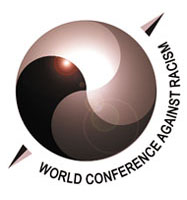


 UN World Conference Against Racism
UN World Conference Against Racism




Posted on 09/30/2003 8:18:36 AM PDT by quidnunc
Kofi Annan's ringing denunciation of unilateralism, and his spirited defence of the United Nations as the cornerstone of "collective security" in the post-Second World War era were, no doubt, music to the ears of those who deplored U.S. President George W. Bush's attack on Iraq to oust Saddam Hussein's regime.
The UN Secretary-General may have been indulging in some wishful, or perhaps revisionist, thinking when he asserted that "however imperfectly, world peace and security have rested" on the UN's founding principles: collective security and the need for Security Council approval to make war.
Bluntly, the UN has been a miserable failure if measured by wars prevented, or its record of legitimizing military force to right egregious wrongs.
Since its founding in 1945, there have been scores of wars, mostly small, to be sure, but some monstrous in their death tolls. From Southeast Asia, where wars raged for decades, to the sporadic but ongoing wars in the Middle East, to genocidal civil wars in Africa and the Balkans, not to mention myriad more minor border wars and clashes, the Security Council has failed far more than it has succeeded.
Only twice, in Korea in 1950, and 40 years later in the first gulf war against Iraq, has the Security Council explicitly authorized the use of full-scale war to enforce its resolutions. The Korean War ended in a stalemate and the divided peninsula remains a conflicted, dangerous (and now possibly nuclear) flashpoint half a century later. The war to liberate Kuwait in 1991 was militarily successful — but it failed, at least to the extent that more than a decade later, the Security Council was again paralyzed by division over how to deal with Baghdad and its outlawed, but unaccounted-for weapons programs — nuclear, biological and chemical.
What really contained the wars in the last half of the 20th century was the Cold War reality: that two superpowers, each capable of obliterating mankind, maintained an uneasy peace, fighting mostly by proxies, and moving in concert to keep little wars from getting out of control. The fear of mutually assured destruction, not the Security Council, prevented and contained conflicts.
As for resorting to unilateralism, it loomed just as large in the past as the present. While many of the offenders were small- or medium-sized military powers, they were legion. Iraq and Iran fought an eight-year war, in which millions died. India and Pakistan fought three wars, Israel and its Arab neighbours four or five, depending on how you count. Argentina invaded the Malvinas, and Britain retook the Falklands. Even NATO allies Turkey and Greece managed a near-war over Cyprus.
On occasion, the superpowers resorted to unilateral war, the invasion of Afghanistan in 1979 by the Soviet Union, or the 1983 U.S. seizure of Grenada being just two examples.
In almost all those instances, nations claimed self-defence, often on grounds no more, or less shaky than Mr. Bush's contention that pre-emptive war against international terrorism, and rogue states that support it, is legitimate self-defence.
There's nothing new about the Security Council's failure to avert conflict or curb unilateralism. What is new is whether superpower unilateralism is more dangerous in a unipolar world.
For the United Nations, the risk isn't more unilateral wars, it is irrelevance.
-snip-
(Excerpt) Read more at theglobeandmail.com ...
Yes, please!



 UN World Conference Against Racism
UN World Conference Against Racism




In my mind, closing down the United Nations is more like sealing off a campground outhouse.
No more UN for US-list
If people want on or off this list, please let me know.
ROFLMAO!! Quote of the Day material!
Would you not agree that engaging them forces them to either act or expose their inactivity? I believe that the Bush administration is purposely engaging them, and as more Americans realize the UN is indeed irrelevant, support for changing it will grow.
You seem to be missing my point. Can you imagine the political fallout of such a speech? The reality is that there are politics involved here. If he were to deride the UN it would be portrayed by the left as his trying to shift the blame for all his own 'failures' to the very UN he defied and didn't listen to.
Instead he will give them every opportunity to prove their ineffectiveness, without giving anyone ammunition to fuel the claim that he is responsible for the UN's failure.
I believe that when all is said an done, most rational people will look back and say, "Hey, Bush gave the UN every opportunity to have a positive influence, and they blew it".
Be patient, this is a chess game, not craps.
Disclaimer: Opinions posted on Free Republic are those of the individual posters and do not necessarily represent the opinion of Free Republic or its management. All materials posted herein are protected by copyright law and the exemption for fair use of copyrighted works.